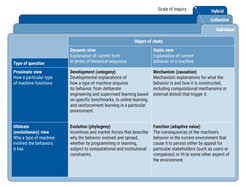Concept 1: Machine Behavior
Understanding machine behavior, including human perception and reaction to such behavior, requires concepts and methodologies from across the behavioral sciences.
The main focus of the Center is around the notion of machine behavior. We are interested in two broad aspects: (a) how intelligent machines behave, and the outcomes that emerge as machines interact with humans; (b) how humans perceive the behavior of machines, and how this perception shapes their expectations and judgment of the machines’ actions and their own behavior. The contours of the emerging field of Machine Behavior were outlined in this article.

adapted from
Rahwan et al., 2019
Despite fundamental differences between machines and biological organisms, we draw inspiration from Tinbergen’s “Four Questions of Biology” in order to organize the different kinds of questions one might ask about machine behavior. Machines have mechanisms that produce behavior, undergo development that integrates environmental information into behavior, produce functional consequences that cause specific machines to become more or less common in specific environments, and embody evolutionary histories through which past environments and human decisions continue to influence machine behavior. These four levels of analysis are summarized in the table on the right.
Fundamental questions in machine behavior include the emergence of human-machine cooperation, potential social dilemmas and moral hazards that may arise from human-machine interaction, the potential role of machines as social catalysts, and the impact of AI on human culture.
Key References
Bonnefon, J.-F., Shariff, A., & Rahwan, I. (2016). The social dilemma of autonomous vehicles. Science, 352(6293), 1573–1576. https://doi.org/10.1126/science.aaf2654
Crandall, J. W., Oudah, M., Tennom, Ishowo-Oloko, F., Abdallah, S., Bonnefon, J. F., Cebrian, M., Shariff, A., Goodrich, M. A., & Rahwan, I. (2018). Cooperating with machines. Nature Communications, 9(1), 1–12. https://doi.org/10.1038/s41467-017-02597-8
Köbis, N., Bonnefon, J.-F., & Rahwan, I. (2021). Bad machines corrupt good morals. Nature Human Behaviour, 5(6), 679–685. https://doi.org/10.1038/s41562-021-01128-2
Rahwan, I., Cebrian, M., Obradovich, N., Bongard, J., Bonnefon, J.-F., Breazeal, C., Crandall, J. W., Christakis, N. A., Couzin, I. D., Jackson, M. O., Jennings, N. R., Kamar, E., Kloumann, I. M., Larochelle, H., Lazer, D., McElreath, R., Mislove, A., Parkes, D. C., Pentland, A. S., Roberts, M. E., Shariff, A., Tenenbaum, J. B., & Wellman, M. (2019). Machine behaviour. Nature, 568(7753), 477–486. https://doi.org/10.1038/s41586-019-1138-y
Rahwan, I., Crandall, J. W., & Bonnefon, J.-F. (2020). Intelligent machines as social catalysts. Proceedings of the National Academy of Sciences of the United States of America, 117(14), 7555–7557. https://doi.org/10.1073/pnas.2002744117
